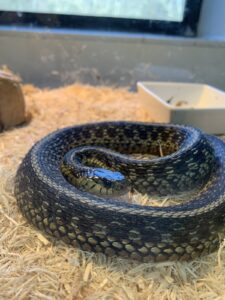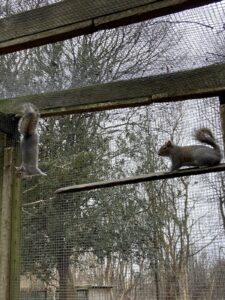As the temperatures continue to drop and we begin to pull our heavy sweaters out from storage, we know one thing is for certain – winter is coming! There are many reasons to enjoy this season: unique changes to our ecosystem, hitting the ski slopes, cozying up by the fireplace, and of course, the holidays. For most of us, however, winter is also associated with grueling temperatures, snowstorms, and a lack of sunshine. These things can have a huge impact on the way we operate in our everyday lives. To get to work on time, you have to shovel out your driveway; in order to stay warm, you have to wear enough layers to keep out the brisk wind.
We may not realize it, but our native wildlife has to make a lot of changes to prepare for the winter as well. During the fall months, some animals choose to migrate to warmer climates where there are more available resources during the winter. Those who don’t must spend the autumn season preparing shelter, food, and other resources in order to survive the winter.
At the Schuylkill Center Wildlife Clinic, we also have to make preparations for the winter. Although we are closed to new intakes, we still have animals in our care from prior to our closure. In October, we must take stock of our patients and determine whether they can be released before the winter arrives. Because the colder weather depletes so many natural resources, it is much harder for wild animals to find food and make shelter in a timely manner. We believe that it is unfair to release certain animals into these conditions, as it would ultimately set them up for failure. Instead, we opt to keep them at our facility for the duration of the colder months and release them when spring rolls around. We call this “overwintering”.
There are some animals that absolutely must be overwintered, like the garter snake that was brought to us after being caught by a dog. After many surgeries to correct four broken ribs and several months of recovery, it was too late in the year for her to return to the wild. Reptiles and amphibians in PA go through a process called brumation when the temperatures decrease (think hibernation, but for our scaly and slimy friends). They will go into a state of inactivity for the entirety of winter and will only reawaken when it gets warm again. Because the garter snake is still recovering, she is better off staying with us until springtime so that her body has more time to heal. If she went into brumation, she would stop the healing process.
We also have about 24 juvenile squirrels living in our care. These squirrels are the last few babies of the summer that were brought to us to be raised. Unfortunately, because they were born so late in the year, they were not ready to be released by our winter cutoff. So, we will continue to provide them with food, water, and shelter in our outdoor enclosures until spring. This allows them some extra time to practice foraging and other natural behaviors while still being monitored by our staff and volunteers. When they are released, the squirrels will have everything they need from their natural environment in order for them to survive.
Not all animals must be overwintered. For example, adult mammals and birds of prey can be released in the colder months without any issues. For mammals, this is because as adults, they have established their winter foraging abilities and likely already have a warm place that they were living prior to admission at the clinic. We try to release them as close as possible to the site they were found to increase the likelihood of them finding their way back home. As for our bigger birds – like hawks, owls, and vultures – most of winter is actually spent scavenging rather than hunting. While there still is a depletion in food sources for them in winter, there is less energetic expense in scavenging for meat than hunting. We attempt to release them near where they were found to ensure that they return to territory with which they are already familiar.
Overwintering is an essential part of wildlife rehabilitation. If we weren’t able to provide this service to our animals, many of them would not survive for very long upon release. The cold months of winter are brutal for all walks of life, but it is important to remember to always be kind to wildlife. They may not have to shovel snow, but Pennsylvania wildlife still deserves recognition for their tireless efforts to get through the frigid months of winter.
By Sydney Glisan, Rehabilitation Assistant

